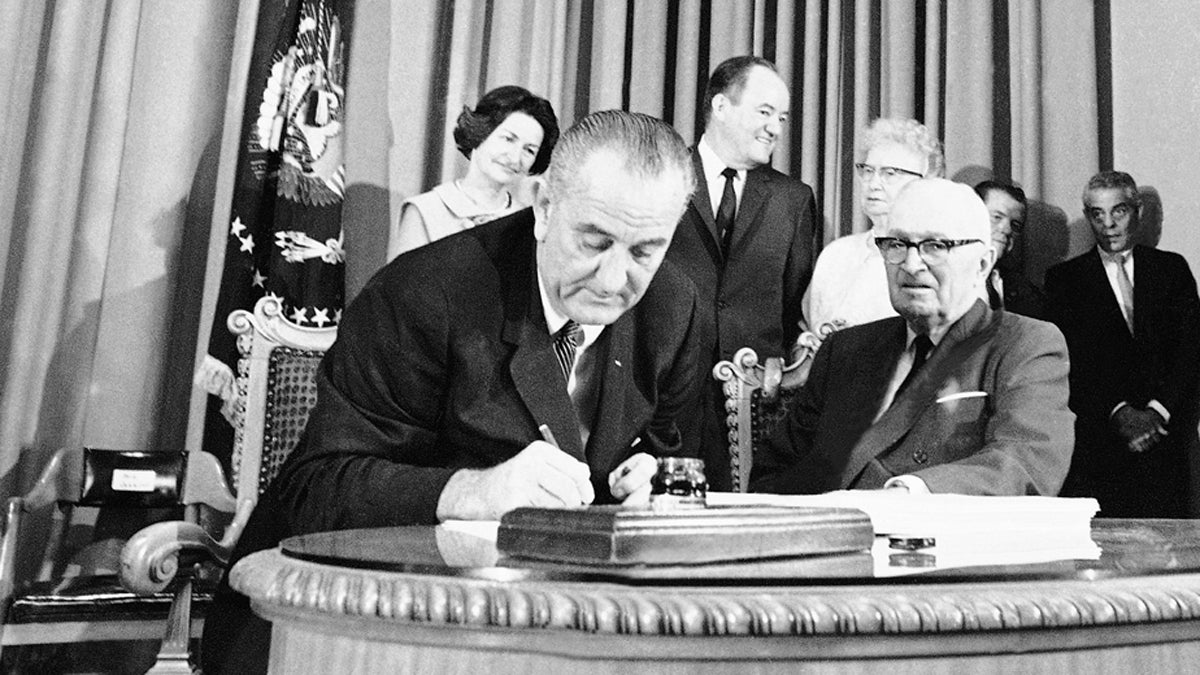Happy 50th birthday to Medicare, and the conservative howlers of yesteryear

In this July 30, 1965, file photo President Lyndon B. Johnson, (left), with former Pres. Harry S. Truman at his side, uses the last of many pens to complete the signing of the Medicare Bill into law at ceremonies at the Truman Library in Independence, Missouri. John signed Medicare for people age 65 and older and Medicaid for the poor into law. His legendary arm-twisting and a Congress dominated by his fellow Democrats succeeded in creating the kind of landmark health care programs that eluded his predecessors. At rear from left are Lady Bird Johnson, Vice President Hubert Humphrey, and former first lady Bess Truman. (AP Photo, File)
Yesterday marked the 50th birthday of Medicare – in LBJ’s words, as he signed that historic achievement, “No longer will illness crush and destroy the savings that (seniors) have so carefully put away over a lifetime” – so let’s take this opportunity to revisit the fright-wing freakout of the early ’60s.
Ronald Reagan put himself on the conservative radar with his apocalyptic claim that socialized medicine for old folks would forever wreak havoc with American liberty. He warned that if a Medicare program were to become law, the government could determine where a doctor can practice medicine; such a law would be “a short step to dictating where he will go.” All told, Reagan warned that “you and I may well spend our sunset years telling our children and our children’s children what it once was like in America when men were free.”
That has to rate as one of history’s biggest howlers. Gallup should ask today’s conservative Medicare recipients whether they’re spending their sunset years feeling less than free. Heck, Gallup should determine what percentage of conservative seniors have refused Medicare coverage in the name of freedom. I’ll go way out on a limb and predict that the percentage is in the neighborhood of zero.
Just as Obamacare will be firmly woven in the national fabric 50 years from now, so it is today with Medicare 50 years after enactment. In the history books, the Cassandra warnings about Obamacare will look as stupid as Barry Goldwater’s ’64 warnings about Medicare. Using the-next-thing-you-know illogic, the conservative icon scoffed: “Having given our pensioners their medical care…why not food baskets, why not public housing accommodations, why not vacation resorts, why not a ration of cigarettes for those who smoke and of beer for those who drink?”
Granted, we all know that Medicare isn’t perfect. (What program – private or public – is perfect?) Its mechanisms are complicated, and there have been periodic funding crises. Medicare’s trustees say that the program is financially stable until 2030 (which is actually a big improvement over recent warnings that stability would cease in 2017), but there will be more strain on the system as Baby Boomers retire en masse.
Nevertheless, its historic successes have been self-evident. Before Medicare was enacted, roughly half of all seniors had health insurance; post-enactment, the figure was 96 percent. Before Medicare, senior poverty was a major crisis in this country; today, thanks to Medicare (and Social Security), only 10 percent of seniors live in poverty. Medicare is so popular that, according to a Kaiser Family Foundation poll conducted in ’09, a whopping 79 percent of Americans say that Medicare coverage should start at age 55.
And now it’s time to state the obvious: If the Democrats hadn’t pushed successfully for Medicare, it never would’ve happened. If Republicans had been running the show 50 years ago, it never would’ve happened. Even though half the Republicans in the ’65 Congress voted Yes for Medicare (back then, GOP moderates still walked the earth), social safety nets have never been their thing.
But to best appreciate Medicare’s political power, take a look at how Republicans have behaved – indeed, surrendered – in the decades since enactment. When Ronald Reagan was president, he signed ’83 legislation that raised taxes in order to help fund Medicare; and he signed ’88 legislation to expand the benefits of Medicare. (I guess he felt that men were sufficiently free after all.) When George W. Bush was president, he greatly expanded Medicare to cover prescription drugs.
Indeed, when Jeb Bush said on the stump last week that “we need to figure out a way to phase out this program” (standard Republican rhetoric), a Jeb spokesman issued a quick clarification, assuring everyone that Jeb merely wants to tweak Medicare with modest reforms, to make it more financially viable. Because Jeb knows darn well that if he’s successfully tagged as the “phase out Medicare” candidate, he’d be toast. (By the way, Medicare is more financially viable today – thanks to the various cost-control provisions in Obamacare. Not that any Republican would ever admit it.)
So happy birthday to Medicare, and kudos to the Great Society-era Democrats who nurtured it to fruition. As President Obama reminded us yesterday, LBJ’s signing established “the fundamental belief that in America, health care is a right and not a privilege.”
Hence the tea-party rallying cry, “Keep government out of my Medicare!”
Laughably ignorant, yes. But consider that placard for a moment. What better evidence do we have that the socialized medicine program is firmly embedded in American life?
Follow me on Twitter, @dickpolman1, and on Facebook.
WHYY is your source for fact-based, in-depth journalism and information. As a nonprofit organization, we rely on financial support from readers like you. Please give today.

